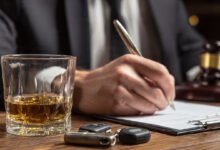EVERYTHING YOU NEED TO KNOW ABOUT SINGLE-VEHICLE ACCIDENTS (2023)

Single-vehicle accidents can be devastating and are often overlooked in discussions about road safety. This article aims to provide a comprehensive guide on everything you need to know about single-vehicle accidents. From the definition of single-vehicle accidents to the causes and consequences, we will cover everything you need to know.
What are Single-Vehicle Accidents?
Single-vehicle accidents are road accidents that involve only one vehicle. These accidents occur when a vehicle collides with an object, such as a tree or a building, or when a vehicle veers off the road and crashes. Single-vehicle accidents are different from multi-vehicle accidents, which involve two or more vehicles.
Types of Single-Vehicle Accidents
There are three types of single-vehicle accidents. These are:
Run-Off-Road Accidents
Run-off-road accidents occur when a vehicle veers off the road and crashes. These accidents can happen due to various reasons, such as driver error, road conditions, or mechanical failure.
Rollover Accidents
Rollover accidents occur when a vehicle tips over and rolls onto its side or roof. These accidents can be caused by various factors, such as high speed, sharp turns, or uneven road surfaces.
Collision with Objects
Collision with objects occurs when a vehicle collides with an object, such as a tree, a building, or a stationary object on the road.
Causes of Single-Vehicle Accidents
Single-vehicle accidents can be caused by various factors. Some of the common causes of single-vehicle accidents are:
Driver Error
Driver error is the most common cause of single-vehicle accidents. These accidents can happen due to various reasons, such as distracted driving, drunk driving, speeding, or fatigue.
Road Conditions
Road conditions can also cause single-vehicle accidents. These accidents can happen due to various reasons, such as wet or slippery roads, potholes, or debris on the road.
Mechanical Failure
Mechanical failure can also cause single-vehicle accidents. These accidents can happen due to various reasons, such as brake failure, tire blowout, or steering malfunction.
Consequences of Single-Vehicle Accidents
Single-vehicle accidents can have severe consequences. Some of the consequences of single-vehicle accidents are:
Injuries
A single-vehicle accident can cause injuries to the driver and passengers. These injuries can range from minor cuts and bruises to severe injuries, such as broken bones, head injuries, or spinal cord injuries.
Fatalities
A single-vehicle accident can also result in fatalities. These accidents can be caused by various factors, such as high speed, collision with objects, or rollover accidents.
Property Damage
A single-vehicle accident can also cause property damage. These accidents can cause damage to the vehicle, other objects on the road, or buildings.
How to Avoid Single-Vehicle Accidents
There are several steps that drivers can take to avoid these accidents. These include:
- Obeying traffic laws and speed limits
- Avoiding distracted driving, such as using a phone or eating while driving
- Maintaining a safe following distance from other vehicles
- Regularly checking tire pressure and other vehicle maintenance needs
- Avoiding driving under the influence of drugs or alcohol
By following these steps, drivers can significantly reduce their risk of being involved in a single-vehicle accident.
What to do if you are involved in a Single-Vehicle Accident
If you are involved in an accident, the first step is to remain calm and call for help if needed. Even if there are no visible injuries, it’s essential to seek medical attention as soon as possible to rule out any internal injuries.
Read More: HOW LONG YOU HAVE AFTER A CAR ACCIDENT TO FILE A CLAIM (2023)
If the accident was caused by a mechanical failure or road condition, it’s essential to document the scene of the accident and notify the appropriate authorities. If the accident was caused by driver error, it’s essential to take steps to prevent future accidents, such as taking a defensive driving course or seeking medical attention for a condition that could have contributed to the accident.
Legal Consequences of Single-Vehicle Accidents
If this accident results in property damage or injuries to others, the driver may be held liable for damages. In some cases, the driver may also face criminal charges, such as for driving under the influence of drugs or alcohol.
Read More: RECOVERING FROM CAR ACCIDENT INJURIES (2023)
It’s essential to seek legal counsel if you are involved in an accident that results in property damage or injuries to others.
Insurance Coverage for Single-Vehicle Accidents
Insurance coverage for a single-vehicle accident depends on the circumstances of the accident and the driver’s insurance policy. In most cases, comprehensive coverage will cover damages to the vehicle caused by a single-vehicle accident, but liability coverage may not cover damages to property or injuries to others.
It’s essential to review your insurance policy and speak with your insurance agent to understand what coverage you have for single-vehicle accidents.
Single-Vehicle Accidents and Autonomous Vehicles
Autonomous vehicles have the potential to significantly reduce the number of a single-vehicle accident. With advanced safety features, such as lane departure warning systems and automatic emergency braking, autonomous vehicles can detect and respond to potential hazards on the road.
However, there are still some concerns about the safety of autonomous vehicles, particularly in situations where the vehicle must make split-second decisions to avoid an accident.
Conclusion
These accidents can be devastating and are often caused by driver error, road conditions, or mechanical failure. By taking steps to avoid these accidents, such as obeying traffic laws and regularly maintaining their vehicles, drivers can significantly reduce their risk of being involved in a single-vehicle accident.
If you are involved in this accident, it’s essential to remain calm, seek medical attention if needed, and document the scene of the accident. If the accident results in property damage or injuries to others, it’s essential to seek legal counsel and review your insurance policy to understand what coverage you have.




3 Comments